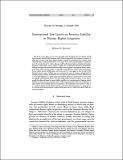| dc.description.abstract |
This Article assesses efforts in U.S. courts, principally under the federal Alien Tort Statute, to hold foreign investors indirectly liable for human rights violations committed by the governments of countries in which they do business. Such claims, though intended as remedies for international law violations, create substantial tensions with international law in two respects. First, to the extent they purport to regulate the non-U.S. activities of non-U.S. entities, they may conflict with international law principles of prescriptive jurisdiction, which limit a nation is ability to regulate the extraterritorial activities of non-nationals. Although an exception for universal jurisdiction allows nations to punish a few especially heinous international crimes without regard to territory or citizenship, it seems difficult to establish universal jurisdiction for most indirect investor liability claims, and in any event U.S. courts appear to have lost sight of this limitation. Second, investor liability suits may misconceive the source of customary international law principles. Because customary international law arises from the actual practices of nations followed out of a sense of legal obligation, its content cannot be derived from analogies to nations practices in areas that are factually and normatively distinct. The only reliable evidence of nations practices is what nations actually have done with respect to investor liability, and there is no consistent practice of imposing indirect liability on investors for host government abuses. While international law allows the United States to impose indirect investor liability upon its own corporations, the United States cannot claim to be doing so as a matter of enforcing existing international law, as the Alien Tort Statute appears to require, nor can it consistent with international law impose liability upon non-U.S. entities over which it lacks prescriptive jurisdiction. |

